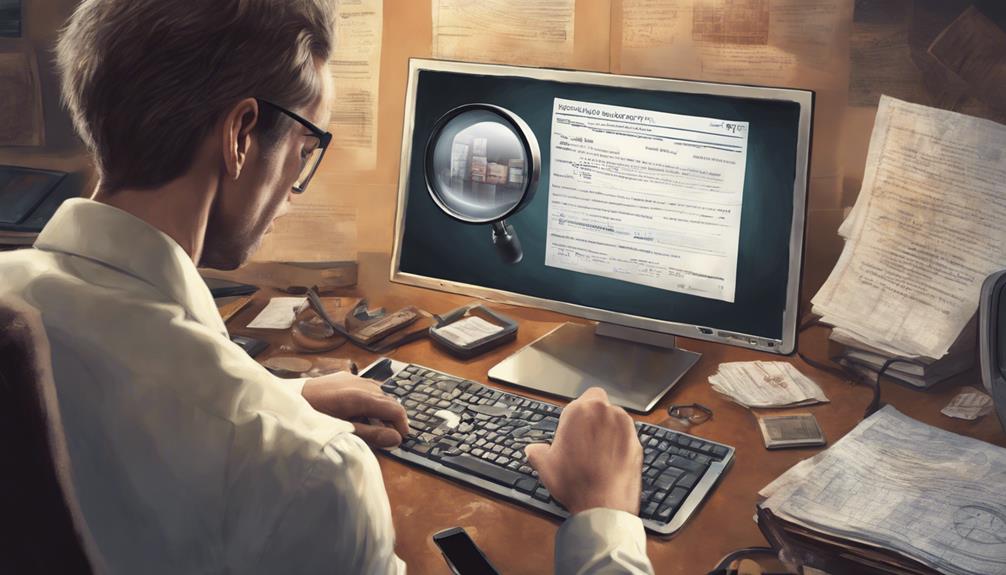Different types of background checks serve essential purposes in hiring processes. Identity verification confirms key details like name, address, and SSN. Criminal checks analyze felonies, misdemeanors, essential for sensitive roles. Credit inquiries assess financial reliability. MVR reports explore driving histories for roles with driving duties. Education verification guarantees qualifications. Fingerprint checks verify criminal records. E-Verify confirms work eligibility. Each check is critical for informed hiring decisions.
Key Takeaways
- Identity Verification: Confirms candidate's identity, SSN, and address.
- Criminal Background Checks: Evaluate felonies, misdemeanors, and risks.
- Credit Background Checks: Mitigate fraud risks and financial reliability.
- MVR Reports: Assess driving history for roles involving driving.
- Education Verification: Confirms academic credentials and degrees obtained.
Identity Verification
Identity verification in background checks is crucial for confirming essential details such as the candidate's name, address, Social Security Number (SSN), and date of birth. Services like ShareAble for Hires utilize record matching logic to reduce false identity matches, ensuring accuracy in the verification process.
This step is vital as it helps employers avoid hiring individuals using fraudulent identities and minimizes the risk of identity theft within their organizations.
Background checks also verify if an SSN has been reported as fraudulent or if it belongs to a deceased individual. Additionally, they can include the verification of active duty alerts and initial fraud alerts, providing employers with a thorough understanding of a candidate's background.
Ensuring accurate identity verification in background checks is essential for making informed and secure hiring decisions. It safeguards businesses from potential risks associated with hiring individuals with misrepresented identities.
Criminal Background Checks

Criminal background checks are essential for roles that involve handling sensitive information or working with vulnerable populations. These checks examine various records for arrests, convictions, and any criminal history that may impact an individual's suitability for a position.
Understanding the types of offenses that can surface during these checks and the legal implications is essential for employers to make informed hiring decisions.
Types of Offenses
When conducting criminal background checks, employers typically search for various types of offenses in a candidate's history. These checks aim to evaluate potential risks associated with hiring individuals with criminal records.
Offenses that may appear include felonies, misdemeanors, and infractions. Employers look for a range of criminal offenses, from theft and fraud to violent crimes such as assault or domestic violence. This thorough examination is essential for roles that involve handling sensitive information, working with vulnerable populations, or maintaining security standards.
Legal Implications
Are there specific laws that regulate the use of criminal background checks in the hiring process?
When it comes to conducting employment background checks, employers must adhere to legal implications set forth by various statutes like the Fair Credit Reporting Act (FCRA) and state laws. Criminal background checks are vital for roles involving sensitive information or security, ensuring the safety of the workplace and vulnerable populations.
These checks typically involve searching county, state, and federal records for information on arrests and convictions. Employers should perform criminal background checks as part of their hiring process to mitigate risks associated with new hires and uphold a safe work environment.
Online criminal background checks play a significant role in verifying a candidate's criminal history swiftly and efficiently. It's important for employers to be aware of the legal implications surrounding criminal background checks to maintain compliance with relevant laws and regulations, protecting both the organization and its employees.
Credit Background Checks
For roles involving financial responsibilities or data handling, credit background checks are essential to mitigate fraud risks and guarantee candidates' financial reliability. These checks provide valuable insights into an individual's financial responsibility, revealing details such as tax liens, poor credit history, and debt issues.
Employers seeking candidates with security clearance or access to sensitive financial information benefit greatly from credit background checks. By conducting these checks, employers can filter out applicants who may pose a risk due to their financial irresponsibility.
Ensuring trustworthiness is critical, especially when individuals are handling sensitive financial data. Therefore, credit background checks play a crucial role in the hiring process, helping employers make informed decisions and safeguard their organizations from potential fraud or financial risks.
It's essential for employers to prioritize these checks to maintain the integrity and security of their financial operations.
MVR Reports

MVR reports are essential for employers to evaluate a candidate's driving history, ensuring they're fit for roles that involve driving responsibilities. These reports contain important information like license status, endorsements, and any vehicular offenses, helping companies make informed hiring decisions.
Understanding the contents of MVR reports is critical for positions where safe driving practices are paramount to job performance.
Driving Record Importance
Evaluating candidates' driving histories through MVR reports is essential for determining their suitability for roles involving driving responsibilities. These reports provide a detailed overview of important aspects such as driving history, license status, endorsements, and any vehicular crimes.
By analyzing MVR reports, employers can effectively assess candidates' driving behavior and safety records, ensuring they meet compliance with industry regulations and safety standards.
Here are five key reasons highlighting the importance of MVR reports:
- Insight into Driving History: MVR reports offer a thorough overview of an individual's past driving experiences.
- License Status Verification: Employers can confirm the validity and status of a candidate's driver's license.
- Endorsements Information: These reports disclose any additional endorsements on a driver's license.
- Identification of Vehicular Crimes: MVR reports can spotlight any past vehicular offenses or crimes committed.
- Assessment of Driving Behavior: Employers can assess a candidate's driving habits and tendencies through MVR reports.
MVR Report Contents
Within MVR reports, candidates' driving histories, license statuses, endorsements, and vehicular crimes are detailed extensively. These reports provide information on past license statuses, including suspensions, revocations, and cancellations.
Employers utilize MVR reports to assess a candidate's driving record and behavior behind the wheel. By examining MVR report contents, employers can determine a candidate's eligibility for positions that involve driving responsibilities. Understanding the details within MVR reports is essential for roles where safe driving practices are paramount, such as for delivery drivers or transportation professionals.
These reports offer a thorough overview of a candidate's driving behavior and history, allowing employers to make informed decisions regarding the individual's suitability for positions that require a clean driving record. By analyzing MVR report contents, employers can make sure that candidates meet the necessary standards for roles that involve operating vehicles and maintaining a high level of safety on the road.
Education Verification

Employers commonly utilize education verification to confirm candidates' academic credentials, degrees obtained, and attendance at educational institutions. This process is vital for verifying that individuals possess the required qualifications as stated on their resumes.
Here are some key points regarding education verification:
- Helps validate the accuracy of information provided by candidates on their resumes.
- Confirms the attendance and completion of degrees at educational institutions.
- Guarantees candidates hold the necessary academic credentials for specific roles.
- Can involve direct contact with educational institutions or third-party verification services.
- Particularly important for positions where specific degrees or certifications are mandatory.
Fingerprint Background Checks

Fingerprint background checks play an essential role in verifying individuals' criminal history and identity for various positions requiring security clearances or handling sensitive information. By scanning and comparing fingerprints against criminal databases, these checks offer a highly accurate and reliable method of identifying potential criminal records. Employers often mandate fingerprint checks for roles in security, government clearances, and sensitive information handling to guarantee workplace security and the safety of employees.
This type of background check is vital for identity verification, especially in high-security environments where trust is paramount. With the ability to pinpoint individuals with precision, fingerprint background checks serve as a fundamental tool in maintaining the integrity of organizations and safeguarding against potential threats. Embracing this technology aids in creating a secure work environment and fostering trust among employees and stakeholders.
E-Verify Background Checks

Electronic verification background checks, known as E-Verify, serve to confirm the legal eligibility of new hires to work in the United States. This online system compares employee information with government databases to validate work authorization.
E-Verify background checks are mandated for federal contractors and in some states for all employers. Employers use E-Verify to verify the authenticity of Social Security numbers and work authorization documents.
E-Verify helps reduce the likelihood of hiring unauthorized workers and ensures compliance with immigration laws. By utilizing E-Verify, employers can streamline the hiring process and maintain a workforce that meets the necessary legal requirements.
This tool acts as a safeguard, confirming that individuals are authorized to work in the U.S., thereby reducing the risk of penalties for non-compliance with immigration regulations.
Frequently Asked Questions
What Is the Most Common Type of Background Check?
The most common type of background check is a criminal background check. Employers conduct these checks to evaluate potential risks and maintain a secure work environment. They are essential for roles involving sensitive data, security, or vulnerable populations.
What Is a Soft Vs Hard Background Check?
Soft background checks verify basic info like identity and employment history. They don't access sensitive data. Hard background checks go deeper, including credit and criminal records. They're common for roles with financial responsibilities or sensitive info access.
What Is a Level 1 Background Check in Florida?
A Level 1 background check in Florida includes a state criminal history record check through FDLE and an FBI fingerprint check. It's a basic check for criminal history information within Florida and nationwide, often required for certain job positions and licensing.
What Is a Level 2 Background Check in Florida?
A Level 2 background check in Florida is a state and national fingerprint-based check. It is mandatory for certain roles like healthcare workers, school employees, and law enforcement. Employers often require it for sensitive positions.
What are the different types of background checks and their respective costs?
There are various types of background checks, including criminal, employment, and credit checks. The cost of background checks varies depending on the type and the agency conducting them. Generally, the more in-depth the check, the higher the cost. It’s important to research and compare costs before deciding on a background check.
Conclusion
To sum up, background checks are an essential part of the hiring process, providing valuable insights into a candidate's history and qualifications.
Just as a chef carefully selects the best ingredients for a delicious dish, employers must carefully choose the right background checks to guarantee they're making informed hiring decisions.
By understanding the different types of background checks available, employers can confidently build a strong and trustworthy team.









